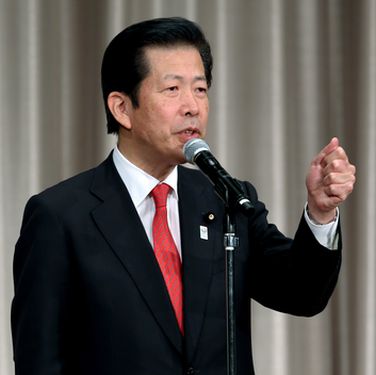Tokyo sends envoy to Beijing in defusing tensions
 0 Comment(s)
0 Comment(s) Print
Print E-mail China.org.cn, January 23, 2013
E-mail China.org.cn, January 23, 2013
A senior official sent by Japan's Cabinet has arrived in Beijing on Tuesday to start diplomatic communication over the Diaoyu Islands issue.
|
|
|
Natsuo Yamaguchi, the head of Japan's New Komeito Party. [File Photo] |
Natsuo Yamaguchi, the head of the New Komeito Party, said he hoped his China trip would open a channel of communication. He confirmed that he has a written letter from Japanese Prime Minister Shinzo Abe for Party chief Xi Jinping.
Observers take a dim view of the envoy's arrival, saying that Tokyo still keeps its hard-line approach as Japanese ministers reiterated their government's stance over the islands.
Yamaguchi will meet with Tang Jiaxuan, former State councilor and current president of the China-Japan Friendship Association. No meeting has been confirmed.
New Komeito is a junior coalition partners of the Liberal Democratic Party. A difference of opinion has emerged between the New Komeito and the LDP.
Before leaving Tokyo's Haneda Airport on Tuesday, Yamaguchi said that he did not discuss "shelving" the Diaoyu Islands issue when he met Abe. On Monday, Yamaguchi had suggested that the issue should be shelved for future generations to tackle.
His remarks prompted a furious response from the LDP. Shigeru Ishiba, the party's secretary-general blasted his idea as groundless and said the Japanese government has not accepted the idea of "shelving".
Japanese Prime Minister Shinzo Abe said on Jan. 22 that Japan sees China as one of its most important diplomatic relationships, but Japan will make no concession on the Diaoyu Islands issue.
Wang Xinsheng, a professor of Japanese studies at Peking University, said hard-line voices, like Ishiba, prevail but others are seeking to resolve the crisis.
In September, the Japanese government illegally "purchased" part of the Diaoyu Islands, which have belonged to China for centuries.
Yamaguchi was a "welcomed" guest of Beijing, said Wang Ping, a researcher on Japanese studies at the Chinese Academy of Social Sciences. Foreign Ministry spokesman Hong Lei said communication was important in easing tension.
Wang said that while the New Komeito Party does have an influential role in Japan, the LDP dominates the Cabinet and has adopted a far harsher stance on the islands than New Komeito. Liu Jiangyong, a specialist on Japanese studies and the deputy dean of the Institute of Modern International Relations at Tsinghua University said that the attitude of the LDP will be crucial.
Yamaguchi said he agreed with his government's stance of denying that there was any dispute over the islands.
Yoshihide Suga, Japan's chief cabinet secretary, hailed Yamaguchi for agreeing with the government's position.
Japanese Foreign Minister Fumio Kishida echoed Suga's viewpoint and said Yamaguchi "knows the Japanese government's stance", Japan's Nikkei Business Daily newspaper reported.
"Tokyo's recognition of the dispute is widely viewed as a precondition for talks regarding the issue," said Zang Zhijun, a professor on Japanese studies at Fudan University in Shanghai.
Wang, the academy specialist, said Abe is following a dual-track approach; acting unilaterally to appear strong at home while appearing to keep a dialogue open with Beijing. Yamaguchi is the latest in a number of prominent Japanese politicians to have visited China recently. According to Kyodo News Agency, former Japanese prime minister Tomiichi Murayama will visit China from Jan 28 to 31.







Go to Forum >>0 Comment(s)